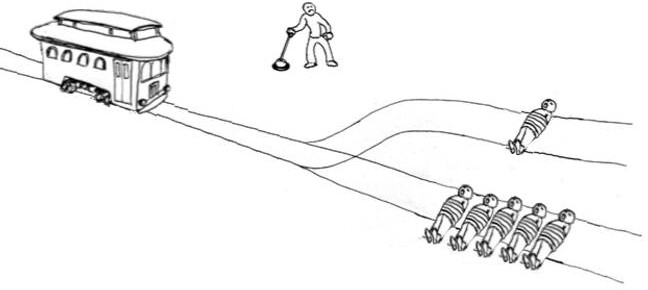The characters in all our most beloved stories are defined by being forced to make difficult choices that test their moral and ethical boundaries. These character dilemmas create tension for the audience as they anticipate how each character's choices will affect the story, and are an incredibly powerful tool in storytelling.
Examples of common character dilemmas range from choosing between two seemingly equal options, such as deciding whether or not to take a job offer, to making complex decisions about how best to help someone else without hurting themselves. Should one follow one’s conscience or obey orders, trust someone or keep secrets, and stay loyal despite pressure from outside forces?
No matter what type of story you’re telling, adding an element of struggle for your protagonist will make it all the more compelling for readers and viewers alike. Let's explore the full range available to you, starting with the powerful moral dilemma.
Moral dilemmas
A moral dilemma is a situation in which an individual has to choose between two options, neither of which is more desirable than the other. A character may be faced with a moral dilemma when they have to decide between two courses of action that could result in either good or bad outcomes.
Moral dilemmas can provide an opportunity to reflect on personal values and ethical commitments. By forcing us to think about difficult decisions between competing moral values, we can gain a deeper understanding of our own moral alignment. We may come to realize that our views on certain ethical issues are more nuanced and complex than we previously thought, or that our values are more consistent and predictable than we realized.
Examples of character dilemmas include decisions such as
- whether or not to lie in order to protect someone
- whether or not to keep a secret that could hurt others
- whether or not to take action against an injustice.
- making a choice in ethical issues such as euthanasia and abortion.
- choosing between two equally important values, such as when a character must decide between being loyal to a friend or telling the truth.
- whether or not to act in their own self-interest or in the interest of others.
These moral dilemmas will deepen the characterization and plot of your story, allowing for more dynamic and meaningful character arcs.
Emotional dilemmas
An emotional dilemma is a difficult choice between two or more emotionally charged options where there is no clear-cut solution. These types of dilemmas often involve sacrificing one thing to gain another, making decisions that could have far reaching consequences, and questioning our own values and beliefs.
Examples of emotional dilemmas include:
- Should you stay with someone you love who is unfaithful, or end the relationship?
- Do you accept a job offer that pays well but goes against your moral values?
- Should you help a friend who has made bad decisions, even when it puts your own life at risk?
- Is it better to forgive someone who has wronged you, or seek revenge?
- Should you tell a loved one the truth about something that could hurt them emotionally?
No matter what decision is made with an emotional dilemma, it will have some sort of consequence. Many times these decisions are difficult to make and require careful consideration before coming to any conclusion.
Philosophical dilemmas
A philosophical dilemma is a situation in which an individual must choose between two or more actions, ideas, beliefs, or values that all have significant implications. Philosophical dilemmas often involve ethical considerations, and therefore require careful deliberation before making a decision.
The trolley problem

The classic you've definitely seen many memes of. Would we be willing to sacrifice one life to save many?
The utilitarian dilemma
Should we pursue our own pleasure or strive to benefit the greater good?
The categorical imperative
Do we act out of obligation or prioritize our own desires?
The paradox of choice
Is it better to have more options and make a potentially wrong decision, or limit ourselves to fewer choices and risk giving up potential opportunities?
The trade-off between freedom and security
Should we be willing to sacrifice our personal liberties in order to feel secure?
The 'is-ought' problem
Can "is" statements about the world lead us to discover what we ought to do, or are ethical decisions based on something else entirely?
The euthyphro dilemma
Do moral acts derive their authority from God's commands, or do they exist independently and God simply commands us to follow them?
The problem of evil
How can a perfect, all-knowing, and all-loving God coexist with the presence of evil in the world?
Personal identity
In what ways can we be sure that our identity is consistent even when our memories and beliefs change?
The nature of reality
Is reality objective or subjective, and to what extent can we trust our own perceptions of it?
These are only a few examples of philosophical dilemmas, but they illustrate the complexity and depth that these questions can have.
In order to make informed decisions in life, it is important to be able to think critically and consider all sides of an issue before making a decision.
While philosophical dilemmas can be difficult to grapple with, they can also provide an opportunity for thoughtful reflection and personal growth.
Ethical dilemmas
An ethical dilemma is a situation that requires an individual or group to choose between two or more conflicting moral principles. In such situations, there is no single “right” answer or solution; instead, decisions must be made based on the individual’s or group’s judgment and sense of morality.
Examples of ethical dilemmas include:
- Should a doctor lie to a patient in order to prevent them from worrying?
- Should journalists reveal private information if it serves the public interest?
- Should an employee report their employer for bad practices, even if it could lead to their dismissal?
- Should an organ donor opt for financial compensation for donating their organs?
- Should a student cheat on an exam in order to get better grades?
- Is it ever acceptable to break the law in pursuit of a greater good?
- Should citizens be allowed to own weapons, even if there is potential for harm?
- Should people with extreme views be censored or allowed to express them freely?
- Should an abused partner stay in a relationship for the sake of their children?
- Should parents be allowed to choose which gender their child will be?
- Is it ethical to take advantage of a natural disaster in order to make money?
- Is it moral to perform animal testing for medical purposes?
Social and cultural dilemmas
Social and cultural dilemmas are conflicts or issues that arise from the interaction of people from different social or cultural backgrounds. They can include anything from inter-cultural misunderstandings to ethical decisions made around religious beliefs, gender roles, economic differences and more.
Gender roles
In some cultures, there are strict gender roles that dictate how people should behave and interact in society. For example, a young woman may feel pressure to follow traditional social expectations for women rather than her own interests and ambitions.
Religious beliefs
People from different religious backgrounds may face conflicting beliefs when it comes to certain ethical or moral issues. For example, a Muslim may be faced with the dilemma of whether to follow religious beliefs around dress codes or to conform to societal norms.
Economic differences
People from different economic backgrounds may have conflicting ideas about what is “right” and “wrong” when it comes to finances and wealth. For example, a wealthy individual may feel guilty about their wealth while someone from a poorer background might be tempted to take advantage of financial opportunities presented to them.
Intercultural misunderstandings
When two people from different cultures interact, they may not understand each other’s values and beliefs. This can lead to tension or conflict when one person’s beliefs are in direct conflict with the other’s. For example, someone from a western culture may misunderstand Eastern cultural expectations around hospitality and kindness.



